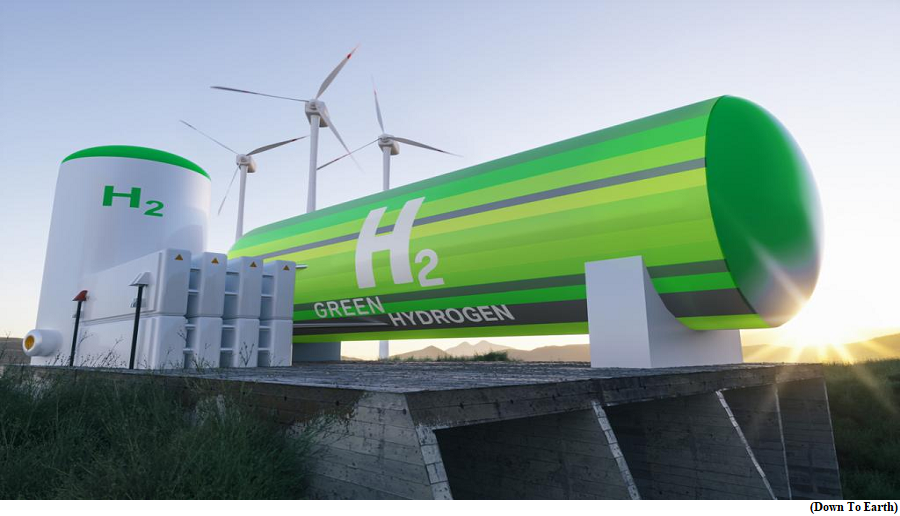MNRE launches scheme to incentivise production of green hydrogen (GS Paper 3, Environment)

Why in news?
- The Union Ministry of New and Renewable Energy (MNRE) has recently published guidelines and incentives to promote the procurement of green hydrogen as part of the National Green Hydrogen Mission.
SIGHT Programme:
- Under the mission, Rs 17,490 crore has been set aside for the Strategic Interventions for Green Hydrogen Transition (SIGHT) programme, to bolster domestic electrolyser manufacturing and green hydrogen production. These incentives are designed to facilitate cost reduction and rapid expansion.
- Implemented under Mode-2B, a system adopted by the MNRE for the SIGHT scheme, this approach involves aggregating demand and soliciting bids for green hydrogen and its derivatives at the lowest cost through a competitive selection process.
- Tranche I of Mode 2B offers a bidding capacity of 200,000 million tonnes per annum.
Execution of scheme:
- The scheme's execution will be entrusted to agencies nominated by the Union Ministry of Petroleum and Natural Gas (MoPNG), primarily oil and gas companies, guided by the Centre for High Technology (CHT).
- Each oil and gas entity will seek bids at the most competitive rates for either a single refinery or multiple refineries.
- CHT will assume responsibility for providing secretarial, managerial and implementation support, as well as fulfilling other responsibilities assigned by MoPNG. Green hydrogen is essential for removing sulfur content in crude oil to produce petrol and diesel.
Background:
- Indian Oil Corporation announced its plan in 2023 to convert 50 per cent of its grey hydrogen to green hydrogen by 2030 by establishing green hydrogen plants in all its refineries.
- Similarly, Hindustan Petroleum Corporation is reportedly constructing a 370 tonnes per annum green hydrogen plant at its Visakhapatnam refinery.
Incentives:
- To qualify for incentives under the scheme, bidders must meet the criteria outlined in the 'National Green Hydrogen Standard' as notified by MNRE.
- The scheme offers a direct incentive over three years from the beginning of production and supply, with rates of Rs 50 / kilogramme of green hydrogen in the first year, Rs 40 / kg in the second year and Rs 30 / kg during the third year.
Monitoring committee:
- A scheme monitoring committee, co-chaired by the secretary of MoPNG, secretary of the MNRE, mission director of the National Green Hydrogen Mission, and other experts, will periodically review the implementation status and performance of capacities awarded or established under the scheme.
- The committee will also facilitate and recommend measures to address challenges.
Caution:
- While countries worldwide are aggressively pursuing green hydrogen to combat emissions, it comes with the risk of greenwashing.
- Environmental organisations have cautioned about potential land-use and water conflicts arising from the significant land and water resources required for green hydrogen production.
IIL launches first indigenously developed Hepatitis A vaccine, 'Havisure'
(GS Paper 2, Health)
Why in news?
- Indian Immunologicals Ltd. (IIL), a wholly-owned subsidiary of the National Dairy Development Board (NDDB) and a biopharmaceutical company in India, launched India's first indigenously developed Hepatitis A vaccine, 'Havisure'.
- The vaccine represents a significant step forward in India's fight against Hepatitis A and is poised to make a substantial contribution to public health.

Details:
- The new vaccine, 'Havisure', is the result of extensive research and development efforts by IIL's dedicated team of scientists and researchers.
- This indigenously developed vaccine is poised to play a crucial role in preventing Hepatitis A, a highly contagious liver infection that poses a significant public health challenge.
Havisure:
- The vaccine is effective in preventing the disease and is recommended for children with routine immunisations.
- It is a two-dose vaccine wherein the first dose is administered at 12 months of age and the second dose is given at least 6 months after the first dose.
- The vaccine is also recommended for individuals who are at risk of exposure or travel to regions with high Hepatitis A prevalence.
- In addition to this, people with an occupational risk of infection and suffering from chronic liver diseases also need the Hepatitis A vaccination.
About Hepatitis A:
- The word hepatitis refers to any inflammation of the liver, the irritation or swelling of the liver cells from any cause.
- Hepatitis A is a viral infection primarily spread through the fecal-oral route, meaning that it is transmitted through the ingestion of contaminated food or water.



